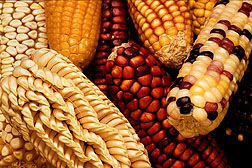This page has been archived and is being provided for reference purposes only. The page is no longer being updated, and therefore, links on the page may be invalid.
|
|
Proposal to Identify Key Corn Genes Wins Top AwardBy David ElsteinOctober 22, 2003 Agricultural Research Service geneticist Michael D. McMullen has won an agency award for a research proposal to search for genes that control agronomically important traits in maize. McMullen won the agency's T.W. Edminster Research Associate Award for the top-ranked proposal for the ARS 2004 Postdoctoral Research Associate Program. Located in the ARS Plant Genetics Research Unit at Columbia, Mo., McMullen will receive $100,000 in funding over two years to support a postdoctoral scientist to help carry out this research. Working with research evolutionists John Doebley from the University of Wisconsin-Madison and Brandon Gaut of the University of California-Irvine, McMullen has developed a novel approach to identify genes that control agronomic traits. The scientists compared the genetic diversity in maize cultivated by Native Americans--and in maize improved by maize breeders--to the genes in wild maize accessions. Maize that has been cultivated over the years by humans has been selected for traits that have helped it adapt to diverse agricultural systems. The researchers are now trying to find exactly which genes are responsible for the adaptations. The problem is that over time, because of breeding, much of the diversity in these key genes has been lost. The postdoctoral researcher that McMullen hires will look at altering the expression of the genes that have already been identified, to see how that alteration affects various agronomic traits. This research should make possible manipulation of these genes in the future to provide an even better product for farmers and consumers. Nearly 400 proposals were evaluated in the program, and 49 others were selected to each receive $80,000 funding over two years for research to help solve agricultural, scientific, nutritional and environmental problems. Other winning proposals include projects on studying obesity in Native American children, developing new technologies to create a safe domestic crop for castor oil production and creating remote sensing technology to quantify forage quality. ARS is the U.S. Department of Agriculture's chief scientific research agency. |

